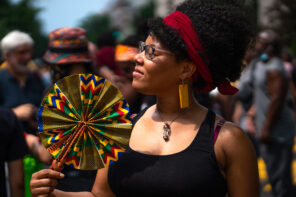Thursday night, the Republican National Convention took America to church—Mormon style.
And Mitt Romney had nothing to do with it.
After eighteen months of fastidiously avoiding the issue of religion—a strategy that at times conveyed the unfortunate impression that his Mormonism was something Romney felt he needed to hide—the Romney campaign invited regular rank-and-file Mormons to do the heavy lifting on religion for them.
First up was Grant Bennett, who served alongside Romney during his tenure as a bishop (or lay pastor) of his Boston area congregation. Bennett explained in plain language Romney’s responsibilities of an LDS bishop—not theology, not ritual, but rather practical service that ranged from counseling physically, economically, and spiritually distressed parishioners to “shoveling snow for the elderly” and folding chairs after church meetings.
Next came Ted and Pat Oparowski, Mormons from New Hampshire who Romney had visited every month when he was serving back in the 1970s as a “home teacher,” a volunteer position held by virtually every participating adult male in the LDS Church. When the Oparowskis’ son David was diagnosed with Hodgkin’s lymphoma, Mitt Romney provided exceptionally thoughtful support to the family and their son through his final days.
Finally, Pam Finalyson recalled Romney’s service to her family when their daughter was born prematurely—he even made an entire Thanksgiving dinner for the family himself—and his caring when that same daughter died two decades later.
Take those three speeches. Add two prayers, three hymns, and a white-bread-and-tap-water sacrament, and that’s pretty much what a Mormon Sunday church meeting sounds and feels like.
We talk about helping one another. We tear up. And we usually try to sidestep the thorny issues.
Of which Mormonism certainly has its fair share: controversial chapters of Church history, a century of racist exclusion, and political opposition to equal rights for women and LGBT people.
But that complex mix of kindness and conservatism is the real stuff of contemporary Mormon life, not the endless chatter about Mormon weirdness we’ve heard during the long Romney campaign from everyone from Bill Maher to Mike Huckabee.
That’s why I found it such a relief to hear Mormonism presented with plainspoken dignity by regular Mormon people.
And then, the regular Mormons left the stage. The politicians returned. Marco Rubio allegedly dazzled. Clint Eastwood rambled. And Mitt Romney concluded the evening with an address most listeners agreed was entirely competent and predictable.
And it’s this divergence between the Mitt Romney described by his fellow Mormons and the Mitt Romney who appeared at the podium a few minutes later that can and should be the subject of solid questions about religion and politics in the closing weeks of this campaign.
These are broad philosophical questions about the role of faith and the role of government in national affairs. How do individual religious good deeds for the ill, elderly, and vulnerable balance against national economic policies that disproportionately impact the ill, elderly, and vulnerable? How does a presidential candidate who has worked closely with the poor countenance a budget that cuts away, for example, at food stamps while preserving military spending and offering tax cuts to the wealthiest? How do individual acts of mercy balance with international saber-rattling?
These are the questions I’ve been waiting for all season long—not the foolish questions fixated on nineteenth-century folk doctrines, or cartoon images taken from low budget anti-Mormon propaganda films—but the questions that get down to the matter of how faith shapes our national moral bearings and provides direction when hard choices face us.
And now is the time to ask them.




